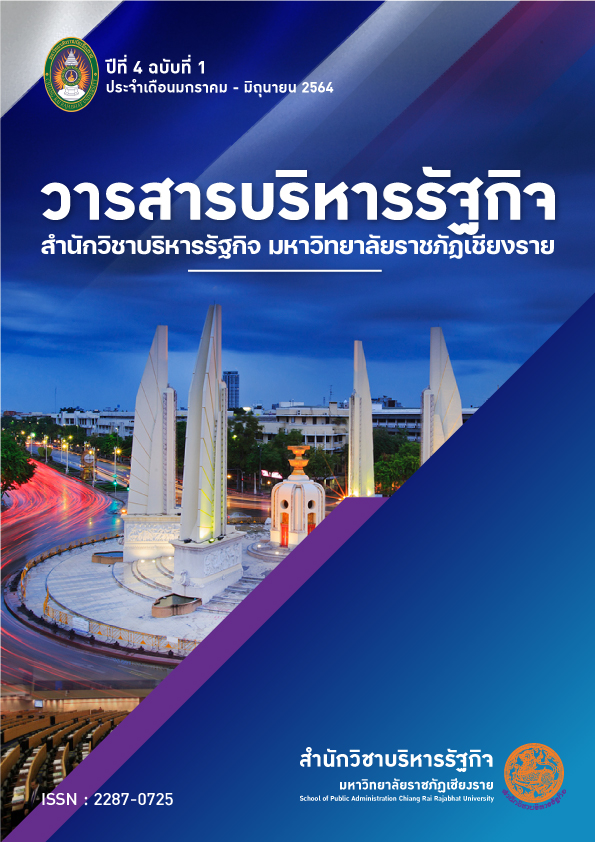Reform of the Thai Royal Armed Forces: Guidelines for Constructing a System of Military Professionalization and Reducing the Role of the Royal Thai Armed Forces under the Control of the Civil Government
Main Article Content
Abstract
This academic article aims to study guidelines for constructing a complete system of professionalizing the military [or military professionalism] under the control of the civilian government in Thailand. The article was conducted by investigating academic books, academic research papers, academic articles, and news made available via various media and complying those documented information with the concept on the construction of military professionalism. The data collection was then analyzed to reveal its results and draw further conclusions. The results of this study revealed that the construction of military professionalism under the willingness [or propensity] of civilians to serve in the military is an essential part of the reduction of the military's role under the control of the civilian government. Not only there should be a total separation of the civilians’principle missions from the military ones, but also there should be a mechanism effectively established for the civilian control of the military in accordance with the provisions of the Constitution relating to a functional chain of command between the civilian government and the military. These will devise a method [or a system] of preventing political interference from all stakeholders involved in [a majority of] military coups that had occurred in the past period.
That’s to say, the guidelines for constructing a complete system of the construction of military professionalism leading to a reduction in the role of the Thai armed forces under the control of the civil government need to place reliance on 4 supporting factors that can be summarized as follows:
The first approach is to amend the Constitution and the Act in respect of military conscription. The amendment should be made under Section 50and Sub-Section 5 prescribed as a person who is forced to serve in the armed forces without their voluntary enlistment. Such a clause can be accounted for a deprivation of the basic human rights of Thai citizens embedded in the constitutional provisions. Thus, any constitutional provisions stipulated in the military conscription should be abolished, leading to constructing a complete system of the military professionalism in Thailand as well.
The second approach is to establish a power base for counterbalancing the armed forces by virtue of mobilizing security personnel from the areas of centralized control to the regional areas [of decentralized execution]. It is considered a determinant of future military-led coups and a spectrum of the troops or military staff in competition with a state of preparedness under military chains of command. It also facilitates constructing a complete system of military professionalism without the conscription.
The third approach is to create a political culture of civilian sector over military influence. Both the political and military parties should make a collaborate effort to formulate rules on any new administrative values that shall be explicitly stipulated in the Constitution.This will enable to take strict control of the armed forces in accordance with the military chains of command by virtue of promoting awareness of a political culture of civilian sector over military influence. With this respect, all parties should behave with integrity in the reform of the Thai Armed Forces.
The fourth approach is to reduce the political role of high ranking officers and retired Army generals. The contributory factor of staging the coup in Thailand was mostly driven in support of a group of retired Army generals who used to hold a senior position in Royal military cadet academy. Thus far, they still exercise their political influence from holding higher positions in state-owned enterprises. In addition, the retired people have the roles to play in parliament as senators appointed by the National Council for Peace and Order (NCPO) after the general election in 2019. It is more difficult to construct a complete professional military system and control the army under a civilian government. Since a group of these people has infiltrated into every government organization or agency and continues to support the existence of a large military organization. It is therefore expedient to reduce the political role of a senior military officer by enacting a law rectified in the prohibition of not being a person holding any position in whether private or public agencies as well as organizations.
Article Details
References
ทวี แจ่มจรัส. (2562). การเป็นทหารอาชีพของไทยกับพฤติกรรมประชาธิปไตยของทหาร. สืบค้นวันที่ 15 มกราคม 2563, จาก https://www.matichon.co.th/news-monitor/news_1733824
ทวี แจ่มจรัส และคณะ. (2562). บทบาทของนายทหารบกระดับกลางที่มีอิทธิพลต่อการเปลี่ยนแปลงการเมืองไทย. วารสารสมาคมนักวิจัย, 23(2).
ทวีศักดิ์ เกิดโภคา. (2561). อาจารย์โรงเรียนนายร้อยเสนอปรับหลักสูตรเน้นการสอนทหารใหม่ให้คิดเป็น วางรากฐานประชาธิปไตย. สืบค้นวันที่ 15 มกราคม 2563, จาก https://prachatai.com/journal/2018/09/78674
ไทยรัฐออนไลน์. (2557). ตรวจแถวทหาร-เช็กขุมกำลังปฏิวัติ!!!. 15 มกราคม 2563, จาก https://www.thairath.co.th/content/394160
ธวัชชัย ผลสะอาด. (2560). มาตรการทางกฎหมายเกี่ยวกับการเกณฑทหารและการจัดการกำลังสำรอง. วารสารวิชาการ มหาวิทยาลัยราชภัฏพระนคร, 8(2).
พลอย ธรรมาภิรานนท์. (2560). พลเรือนควบคุมทหาร : หนทางสู่ประชาธิปไตยที่มีเสถียรภาพ. สืบค้นเมื่อ 15 มกราคม 2563, จาก https://www.the101.world/civilian-control-of-the-military/
มติชนออนไลน์. (2562). ก.ห.ตั้งโต๊ะแถลง ความจำเป็นต้องมีเกณฑ์ทหาร วอนพรรคการเมือง อย่ายกเป็นนโยบาย. สืบค้นวันที่ 15 มกราคม 2563, จาก https://www.matichon.co.th/politics/news_1382520
รัฐสภา. (2560). รัฐธรรมนูญแห่งราชอาณาจักรไทย พ.ศ. 2560. กรุงเทพฯ: รัฐสภา.
ศิวัช ศรีโภคางกุล. (2560). กระบวนการสร้างประชาธิปไตยผ่านการปฏิรูปกองทัพและการสร้างความปรองดองใน ประเทศอินโดนีเซีย. วารสารการบริหารปกครอง, 6(1).
ศิวัช ศรีโภคางกุล และเทอดศักดิ์ ไป่จันทึก. (2560). การเกณฑ์ทหารกับการทรมาน และการละเมิดสิทธิมนุษยชนต่อทหารเกณฑ์ในประเทศไทย: บทวิเคราะห์จากมุมมองหนังสือรัฐศาสตร์ไม่ฆ่า. วารสารนิติสังคมศาสตร์ มหาวิทยาลัยเชียงใหม่, 10(2).
ศุภณัฐ บุญสด. (2561). การควบคุมทหารโดยพลเรือนในระบบกฎหมายไทย. วารสารกฎหมายสงขลานครินทร์, 1(1).
สรศักดิ์ งามขจรกุลกิจ. (2561). การออกแบบระบบการศึกษาทางทหารของไทยใหม่เพื่อการผลิตทหารอาชีพและการปฏิรูปกองทัพ. วารสารวิชาการมนุษยศาสตร์และสังคมศาสตร์ โรงเรียนนายร้อยพระจุลจอมเกล้า, 5(1).
สรศักดิ์ งามขจรกุลกิจ และชัญญาพัทธ์ วิพัฒนานันทกุล. (2559). ระบบการเรียนการสอนของโรงเรียนนายร้อยสหรัฐอเมริกากับปรัชญาและ “หัวใจ” ของการผลิตทหารอาชีพ, วารสารวิชาการมนุษยศาสตร์และสังคมศาสตร์ โรงเรียนนายร้อยพระจุลจอมเกล้า, 3(1).
สุรชาติ บำรุงสุข. (2558). เสนาธิปไตย: รัฐประหารกับการเมืองไทย (พิมพ์ครั้งแรก). กรุงเทพฯ: สำนักพิมพ์มติชน.
_______. (2561). จะปฏิรูปทหาร ต้องสร้างทหารอาชีพ จะสร้างทหารอาชีพ ต้องปฏิรูปทหาร. สืบค้นวันที่ 10 มกราคม 2563, จาก https://www.matichonweekly.com/column/article_118912
สำนักข่าวช่อง One 31. (2563). ‘บิ๊กตู่’ ชี้เกณฑ์ทหารเลื่อนกระทบกำลังพลอาจไม่พอ. สืบค้นวันที่ 20 มีนาคม 2563, จาก https://www.one31.net/news/detail/19626
BBC News Thai. (2562). อภิรัชต์ คงสมพงษ์: ชี้นักธุรกิจการเมือง นักวิชาการฝักใฝ่คอมฯ “คุกคามความมั่นคง”. สืบค้นเมื่อ 15 มกราคม 2563, จาก https://www.bbc.com/thai/thailand-50009884
_______. (2563). สื่อญี่ปุ่นชี้ "นายพลไทย" ล้นกองทัพ ชาติอื่นใช้ "นายพัน" ทำหน้าที่เดียวกัน. สืบค้นเมื่อ 10 มกราคม 2563, จาก https://www.bbc.com/thai/thailand-50961210


